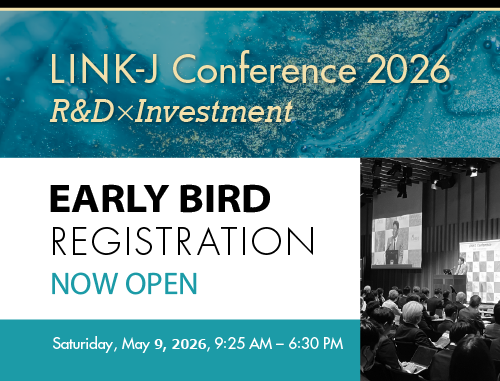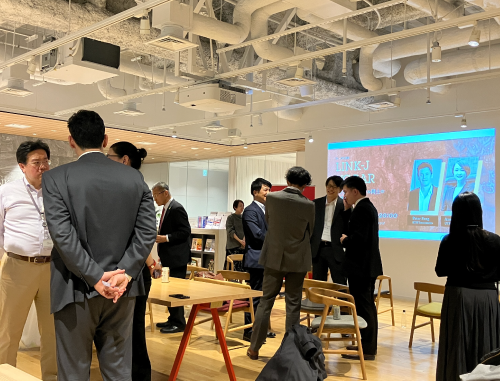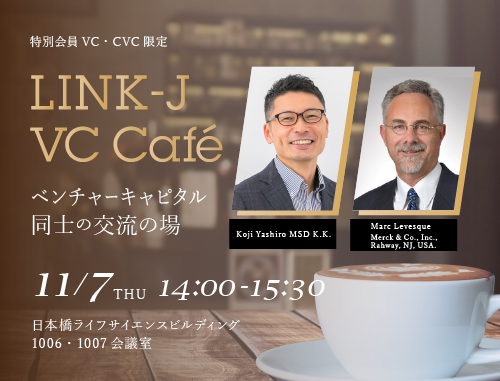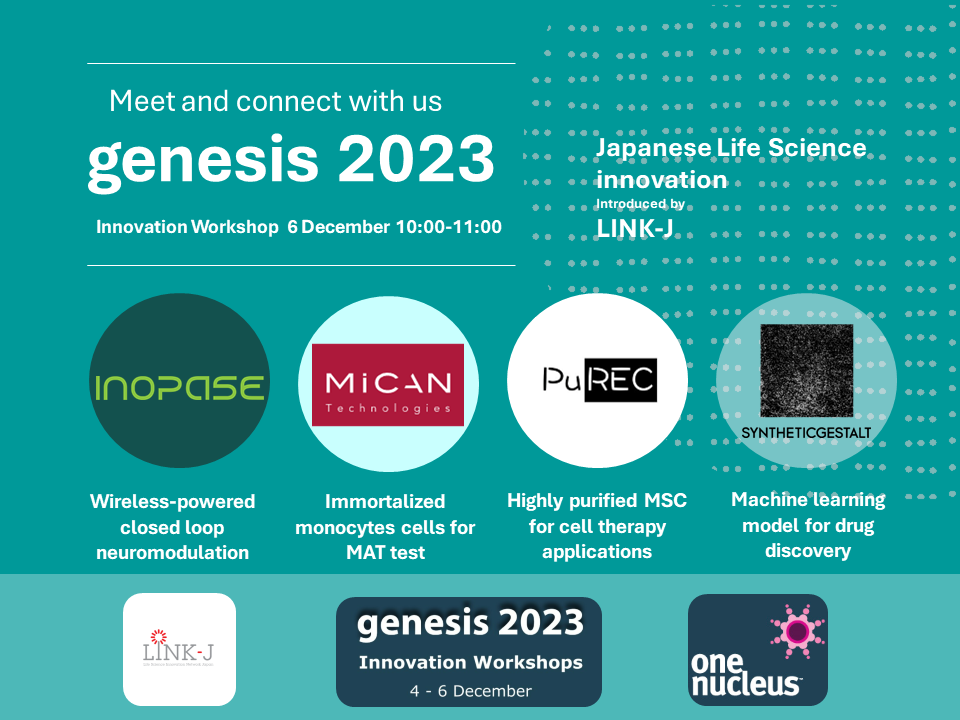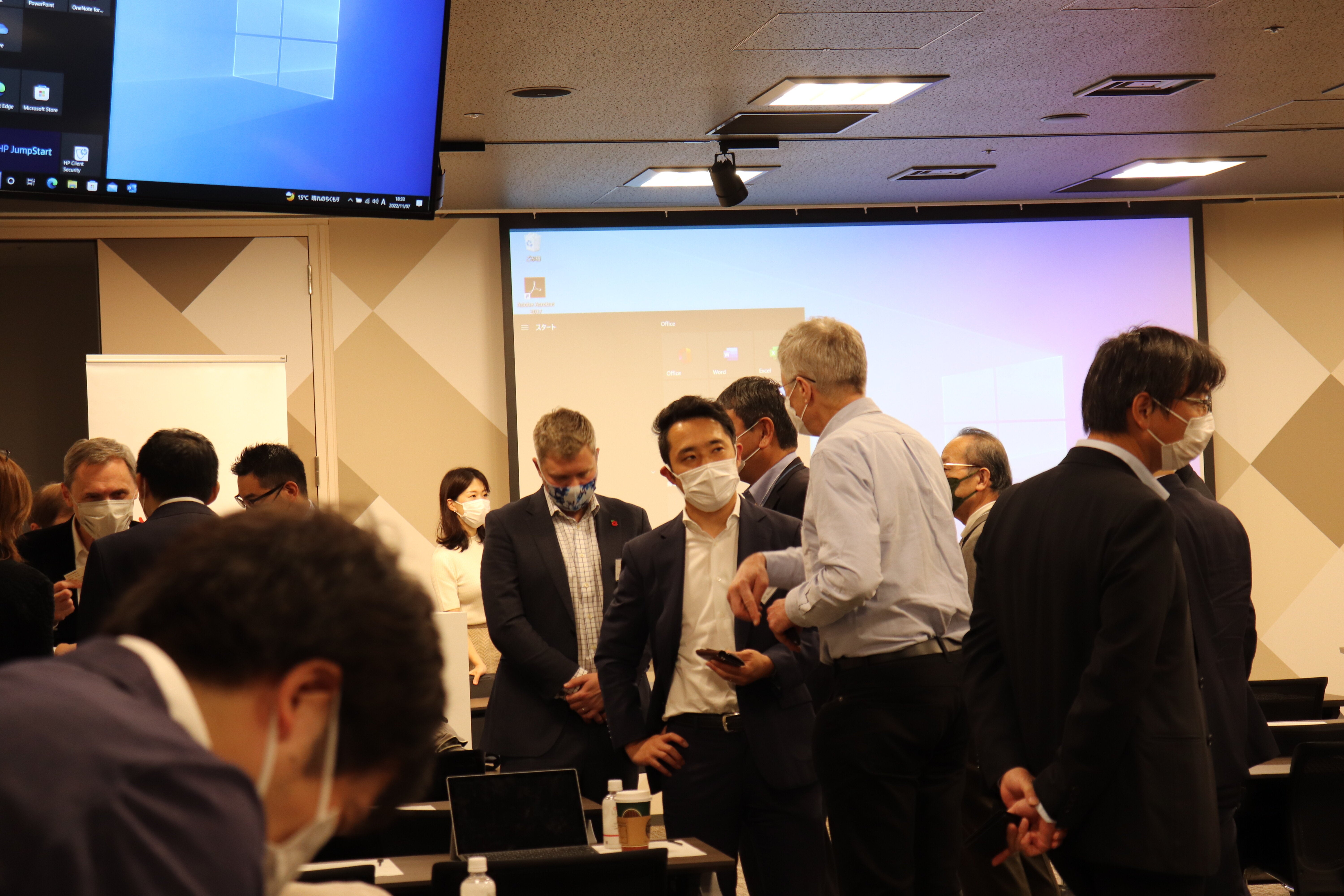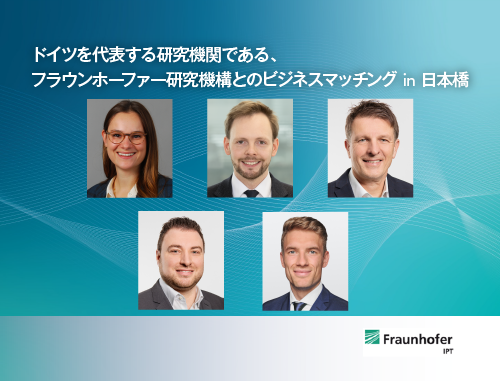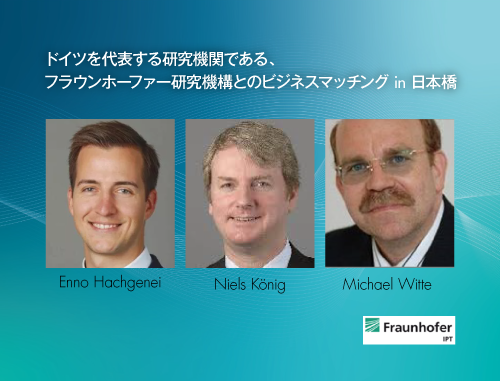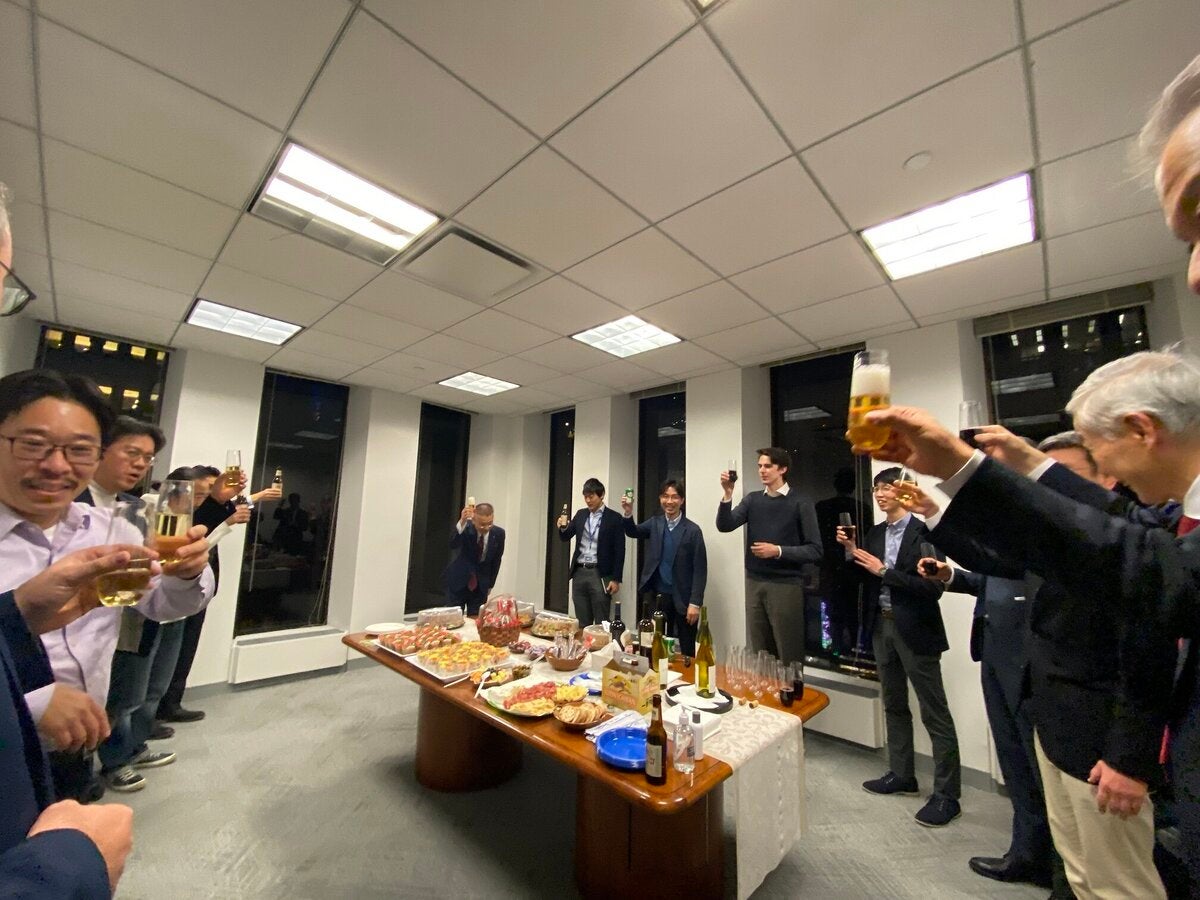 In this issue, we present an interview with LINK-J supporter Masashi Kiyomine and his friend, Ken Horne. Mr. Kiyomine is a venture capitalist who has been investing in medical devices and next-generation healthcare ventures in the U.S. for around two decades. Mr. Horne is an investor and entrepreneur with extensive entrepreneurial experience of startup businesses in the U.S. biotech industry. In this interview, we delved into the question of how the two of them see Japanese startups, as leaders of their own funds toiling to create the future of healthcare. Furthermore, we gleaned some tips on how these startups can compete on the global stage.
In this issue, we present an interview with LINK-J supporter Masashi Kiyomine and his friend, Ken Horne. Mr. Kiyomine is a venture capitalist who has been investing in medical devices and next-generation healthcare ventures in the U.S. for around two decades. Mr. Horne is an investor and entrepreneur with extensive entrepreneurial experience of startup businesses in the U.S. biotech industry. In this interview, we delved into the question of how the two of them see Japanese startups, as leaders of their own funds toiling to create the future of healthcare. Furthermore, we gleaned some tips on how these startups can compete on the global stage.
*Japanese page
Funds arise to support company registration in the U.S. and NASDAQ listing.
――Tell us a little about the career path that has brought you to where you are.
Masashi Kiyomine I have lived in the U.S. since I was 11 years old and majored in mechanical engineering at university. After graduation, I joined Mitsui & Co. Global Investment (MGI), where I engaged a number of investment deals with the medical device team at New York office. It was fortunate I could cultivate my investment career at a young age while absorbing various business styles of major Japanese corporations and American financial/non-financial businesses. Six years later, I was transferred to Silicon Valley office and became the head of the Global Life Sciences team. In 2021, after 13 years at MGI, I founded Kicker Ventures, a fund that specializes in investing in the next-generation healthcare area, and is currently working on both East Coast and West Coast deals from the base in Philadelphia.
Ken Horne I was born and raised in Stanford by college professor parents. I studied mechanical engineering, which also covered medical engineering, at Stanford University. I started my business carrier at The Foundry, one of the top incubators in medical technology. During the six or seven years I worked there, I built up experience of company creation, and in parallel, I did R&D for a cardiology-related startup. I later founded the VC fund TauTona Group in 2010. TauTona's strategy has been to engage in creation of startup companies and invest in them. After establishing Aline Aesthetics, a biomaterials company, I assumed the general manager role and successfully accomplished the acquisition by Allergan (AGN) in 2014. Then, Symic Bio appreciated this achievement and recruited me as their CEO, and there I experienced another acquisition of the company later. After that I served as President/CEO of two other companies until 2020. Later, Masashi's former colleague, Taro Inaba, invited me to become Chairman of RDiscovery, and after two years of involvement in several startups, I founded AN Ventures in Japan this year.
――Please tell us about your relationship.
Kiyomine Symic Bio was one of the deals that the Life Sciences team was handling at MGI. That's where I got to know Ken, who was the CEO, and as we worked together we really hit it off. I was particularly impressed with Ken's team-building capabilities. While I have seen many different types of CEOs at work, Ken in particular is open and inclusive in everything he does, from the composition of his Board of Directors to how he proceeds meetings. He is good at bringing his board members together to work hard and succeed as a unified group. So two years ago, when I launched my own fund, I asked Ken to be an advisor.
Horne Thank you, Masashi. Team building is exactly what I place emphasis on in my management. Sometimes startup companies' presidents are dismissive of outside directors from VC firms, but I have always considered outside directors as key colleagues for the growth of the company, and I have always thought about how to work with them with a positive forward posture. However, I don't think that all members need to agree with the president, and I believe that I can trust a person like Masashi who might sometimes say, "Ken, I don't agree."
――You two currently manage your own funds. What was your motivation for founding VCs and what do you hope to achieve there?
Kiyomine Rather than wanting to create my own fund, my motivation came from a long and hard thought process about what work I could do that would use my experience to give back the most to society. My conclusion was to start a fund in next-generation healthcare. When I started my carrier, the role of VC was to invest in early stage, provide hands-on entrepreneurial support, and when the business exited, return the experience gained as a benefit to the next business. I wanted to create this kind of modern version of old-fashioned VCs nurturing startups together. The investment focus is next-generation healthcare. Nowadays, healthcare is undergoing a paradigm shift with the fusion of AI, remote technology, robotics, and digital. We are trying to create healthcare beyond what is covered by the concept of digital health.

In our pursuit of innovative solutions, it came to be that companies utilizing AI technology made up the majority of our portfolio. Some of the applications in our portfolio are DTx, (i.e., Digital Therapeutics) and microbiomes, while others are biomaterials, robotics, and gaming. The therapeutic areas are also wide-ranging, including depression, cancer, pain, and digestive disorders. Our investment style includes lead investments and initial VC investments for startups. Before long, we were surrounded by like-minded fellow VCs and industry experts. We call these friends AIR (Advisors-in-Residence) and I think it is quite something that we have created such an ideal community around ourselves, rather than joining an existing community. There are many things I want to achieve, but one of them is to prove that Kicker, founded by me, who is Japanese, can succeed in the U.S. as an American VC. I believe this is what I can contribute to Japan in my own way.
Horne For me, I was approached by ARCH Venture Partners, a top American VC in the bio-healthcare field. This fund is considering expanding its business in Japan, and ARCH has given me the discretionary ability to create the framework for what kind of fund we would put together in Japan. Operating a fund in Japan means creating a platform for that country's specific ecosystem. We decided to create a fund specialized in Japanese biotechnology investment because if we could create a new kind of fund that had never been seen before, it would serve as a stimulus to existing funds in Japan and even the entire life sciences industry. I had a hard time leaving RDiscovery, but when you have the biggest opportunity of your life in front of you, you have to grab it.

What we are trying to do at AN Ventures is developing Japanese startups into global companies in a sprint, without going through JASDAQ. Investments are in university research before company founding or startups in the early founding stages. We engage from the company creation stage and let the company registration is done in the U.S. This is because the U.S. has a legal and tax system that facilitates the growth of startups and makes it easier to receive investment from American VCs.We also support IP strategies based on the premise of global business development, aiming for NASDAQ listing or large-scale M&A as exit strategies. If we can create a successful example of a made-in-Japan global company, American investors will be more interested in Japanese technology, and we hope to be a catalyst for this.
Funds invest in technology out of "fear" of lagging behind competitors and "greed" to make a profit, but Japanese technology is currently not even considered a "greed" target, let alone a "fear" target. We want to help break out of this situation. I also believe that if we can create global success stories in familiar places, we can create a positive spiral that will encourage more bio-healthcare startups to target the global market, which will further influence the next generation of researchers and entrepreneurs. My desire is to contribute to revitalizing the entire ecosystem in Japan through AN Ventures' investment activities.
Government, entrepreneurs, and VCs must accelerate their efforts to "win on the global stage"
――A commonly-cited issue in Japan's life sciences and healthcare industries is that while there are excellent seeds available, they have not yet been put to practical use. What do you think about this?
Horne As we can see from the numerous examples of Nobel Prize winners, basic research in Japanese academia is among the best worldwide. I have also just started to uncover seeds at our fund, and I have come to realize there are many technologically superior products in Japan. Besides, Japan has some particular research with limited impact from other technologies, which is quite interesting. What is unfortunate, however, is that the researchers and other stakeholders have no experience in translation (bridging basic research to practical application). There are very few experienced people who understand how to use capital and commercialize, and we hope to make up for this lack of experience.
Kiyomine In Japan, we still see people with a belief in the technology as sole driver that cutting-edge and unique technologies alone will open up markets, but I believe that this business mindset does not enable global success. The company must bring itself into a win-win situation by thoroughly examining its needs, evaluating market growth potential, evaluating competitor technologies, determining the potential for partnerships, and hiring people who can drive the business forward. The battle isn't over technology; it's a battle of business. However, as Ken mentioned, I believe that the facts that Japan has particularly unique research and that it has become a super-aging society ahead of other countries and faces a variety of challenges is likely to be an advantage. Where there are challenges, opportunities will arise.
――In the past couple of years, there appears to have been an increase in the number of Japanese startups aiming to expand into the largest market, the U.S., quite soon after their establishment. What are the possible reasons for this?
Kiyomine Among the Japanese entrepreneurs I have been in contact with, the more talented ones have moved to establish their companies in the U.S. It has been said for a long time that Japanese market is shrinking, but in addition, the recovery from the COVID-19 shock has been slower in Japan than elsewhere. When combined with various factors such as exchange rates and prices, people have probably come to fear that staying in Japan will not be good for them.
Horne The "new capitalism" economic policy of the Kishida administration may have some influence here as well. This is because the Japanese government is focusing on nurturing startups, with biotechnology as a priority area.
Kiyomine Indeed, in recent years, the government has been promoting the "J-Startup" entrepreneurship development support program to create companies with potential of competing on the global stage and has been building momentum for global expansion. On the other hand, funds like Ken's AN Ventures have been appearing that are targeting NASDAQ listing from the start, and we at Kicker have started a project to provide Japanese startups with the skills they need to expand their business globally.
The overall level of activity is probably rising due to the multilayered accumulation of separate efforts by various organizations, including governments, entrepreneurs, and funds, as well as individuals. To use an analogy, it is similar to the elevation of Japanese soccer when the JFA created a professional league under the J.League's Hundred Year Plan, each club team created an environment, individual players improved their skills by transferring overseas, and the hurdle to transferring overseas dropped as private companies have begun management of European club teams. In order to nurture startups that can compete globally, it is important for all stakeholders to put out their best efforts from their respective positions.
――What kind of encouragement can you give to entrepreneurs who are looking toward the global stage?
Kiyomine In this age of AI where the rapid increase in what machines can do for us, I think the real thrill of being human is to challenge ourselves to do what we really want to do. If there are entrepreneurs among you who want to take on the global market, I hope you will accept this challenge without intimidation.
Horne Some entrepreneurs try to hide their company's weaknesses from VCs, but we want them to be open to VCs about their weaknesses and ask for help. That's because it's also our job to find the necessary resources that may be outside their company. We are part of a team, so let's work together and get past these challenges.

――Finally, what are your expectations for LINK-J?
Kiyomine Knowing the days when LINK-J didn't exist, I'm happy to know that such a community has been established. It is a treasured community where people can gather, share information, and complement each other's experiences. In the future, I hope that they will further promote the globalization of LINK-J, which they have already begun to do.
Horne When American investors look to Japan, there is no better place to get information than LINK-J. I would like to see active global messaging, including disseminating information in English, as well as inviting overseas academics, entrepreneurs, and VCs to events.
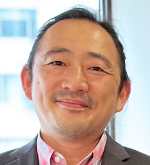 Masashi Kiyomine LINK-J Supporter / Founder and Managing Partner, Kicker Ventures
Masashi Kiyomine LINK-J Supporter / Founder and Managing Partner, Kicker VenturesAfter graduating from Dartmouth College in the U.S., he began his career at Mitsui Global Investment in 2004, where he was responsible for venture investments in early-stage healthcare startups worldwide based in the U.S. He has successfully facilitated multiple exits with a focus on next-generation healthcare and medical devices. In 2021, he formed the first Kicker Ventures fund and engages in venture investments in the U.S. with the theme of co-creating the future of health care.
 Ken Horne Founder and Partner, AN Ventures
Ken Horne Founder and Partner, AN VenturesHe holds a B.S. and M.S. in Mechanical Engineering from Stanford University. His career began at The Foundry, a medical technology incubator, and in 2010, became a founding member of the TauTona Group and CEO of Aline Aesthetics, in which TauTona Group has a take. He has since served as CEO of several companies and has been instrumental in raising capital and selling companies. His most recent tenure was two years as Chairman of RDiscovery, a start-up support subsidiary of Remiges Ventures in the U.S., after which he founded AN Ventures in Japan in 2023.
